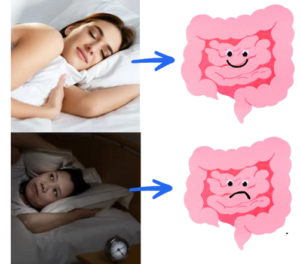Exploring the Essential Connection Between Quality Sleep and Optimal Digestive Health
Quality sleep is not just a time for rest; it is a vital physiological process that significantly influences our digestive health. While the link may not be immediately clear, the complex relationship between sleep and digestive wellness involves numerous biological functions working harmoniously. The body’s circadian rhythm, often called the internal biological clock, governs both sleep patterns and digestive functions. This intricate connection explains why many people feel hungry at regular intervals throughout the day, illustrating how our bodies are finely tuned to align with natural biological cycles that dictate our hunger and digestion.
Maximizing Digestive Health Through Quality Sleep 
Quality sleep is crucial for the body’s capacity to heal, rejuvenate, and restore its systems effectively. The deeper stages of sleep are particularly vital for these restorative processes. During these profound phases, the organs, tissues, and cells that make up the digestive system not only relax but also engage in critical repair activities. The body prioritizes cellular repair and growth during deep sleep, which is particularly important for regenerating the cells that line the digestive tract, which face continuous wear and tear due to exposure to food particles and digestive enzymes. This regeneration plays a key role in maintaining the integrity of the gastrointestinal lining, which enhances the efficiency and effectiveness of digestion.
Deep sleep is essential for bolstering the immune system, especially for the digestive system, which houses its unique immune cells activated by the beneficial bacteria residing in the gut. These immune cells play a crucial role in defending the gut and the entire digestive system against harmful microorganisms, ensuring a balanced population of bacteria within the gut ecosystem, which is vital for overall health and wellness.
Additionally, the organs involved in the digestive system play a significant role in detoxification processes, which aid in the removal of waste and harmful substances from the body. Deep sleep enhances the detoxification process by improving the functional efficiency of the liver and kidneys, allowing these organs to operate at their best. This synergistic relationship between sleep and detoxification is instrumental in promoting overall digestive health and personal well-being.
Uncovering the Connection Between Gut Motility and Sleep Cycles
A vital aspect of digestion is the effective movement of food and waste through the digestive tract, a process known as gut motility. This essential process experiences significant changes during sleep. Throughout both deep and light phases of sleep, the rate of gut motility is notably reduced. This decrease is a necessary adaptation, allowing the digestive system to conserve energy, which is redirected toward repairing digestive tissues. Such energy conservation enables the digestive process to function more efficiently during waking hours, optimizing both nutrient absorption and waste elimination, which are crucial for maintaining digestive health.
The migrating motor complex is a series of contractions that occurs during fasting periods, including during sleep. This cycle is integral to gut motility, as it effectively sweeps away food particles and residual matter that may linger in the digestive system. This natural cleansing mechanism of the digestive tract minimizes the risks of bacterial overgrowth and fosters a healthy gut environment, which is essential for overall digestive health. Importantly, the migrating motor complex is most active during nighttime when individuals are fasting and asleep, underscoring the vital role of sleep in safeguarding the health of the digestive system.
As dawn approaches, the rate of gut motility gradually increases, effectively preparing the digestive system for efficient food processing and digestion. This increase in motility can also trigger the first bowel movement of the day, illustrating the finely tuned connection between sleep and gut motility. Understanding and optimizing this relationship is vital for enhancing digestive health and promoting overall well-being.
Exploring the Hormonal Dynamics Impacting Sleep and Digestion
Ghrelin, commonly known as the hunger hormone, plays a significant role in stimulating appetite. Conversely, leptin informs the brain that the stomach is full, helping to regulate food intake and prevent overeating. Together, these hormones are crucial for appetite regulation, but their functionality can be adversely affected by inadequate sleep.
Even one night of poor sleep can elevate levels of ghrelin, leading to increased appetite and often resulting in cravings for carbohydrates. This state is often described as feeling ‘hangry’. Compounding this issue, levels of leptin can drastically decrease after a night of insufficient sleep, disrupting the signaling that indicates fullness. This creates a challenging scenario where individuals may overeat and make unhealthy food choices, struggling to listen to their body’s signals to stop eating. While occasional poor sleep may not have severe consequences, chronic insomnia can lead to significant digestive complications, including inflammation in the gut, liver disorders, gastroesophageal reflux disease, inflammatory bowel disease, and even colorectal cancer, while also contributing to weight gain.
Understanding the Consequences of Sleep Disruption on Digestive Health
Disruptions to sleep can lead to a wide array of digestive issues. Factors such as shift work, particularly night shifts, and jet lag can severely disrupt sleep patterns and disturb the body’s internal clock. Additionally, consuming food late at night or maintaining irregular meal schedules can negatively impact the quality of sleep. The circadian rhythm, which regulates sleep, is closely linked to natural sunlight, which is essential for sustaining a healthy sleep-wake cycle.
Unfortunately, in today’s technology-driven world, many people spend the majority of their time indoors, leading to reduced exposure to natural light. This shift has increased exposure to blue light emitted by devices such as laptops, televisions, and smartphones, further disrupting the sleep cycle and overall sleep patterns, particularly when this exposure occurs close to bedtime.
The cumulative effects of these factors can result in serious digestive issues, including diarrhea, ulcers, inflammatory bowel disease, and disturbances to the delicate balance between beneficial and pathogenic bacteria in the gut. This imbalance may further compromise the gut lining, exacerbating challenges related to digestive health and overall wellness.
Boosting Microbiome Health by Prioritizing Quality Sleep
The microbiome consists of trillions of microorganisms residing in the gut, primarily composed of beneficial bacteria known as probiotics, as well as viruses, fungi, and potentially harmful bacteria. These microbes are crucial not only for overall health but also for digestive health. They play an essential role in enhancing immune response and assisting in digestion, facilitating the production of specific vitamins, enzymes, hormones, and amino acids. Recent studies have unveiled a substantial connection between the microbiome and sleep, indicating that disrupted sleep or chronic insomnia may negatively affect the balance of these microbes, ultimately impacting digestive health and overall well-being.
Understanding the Complex Interactions Between Microbiome Health and Sleep Quality
The relationship between sleep and microbiome health is intricate and multifaceted. Poor sleep can have detrimental effects on microbiome health, while an unbalanced microbiome can also adversely impact sleep quality. To better grasp this complex interaction, a study revealed a correlation between a higher abundance of specific bacterial types in the gut and quicker sleep onset, along with fewer nighttime awakenings. While this article cannot delve into every finding, the key takeaway is that nurturing a diverse and abundant population of beneficial bacteria in the gut is essential for achieving optimal sleep, effective digestion, and maintaining overall health.
Examining the Interplay Between Stress, Sleep, and Digestive Health
A prevalent consequence of stress and anxiety is disrupted sleep. Conversely, these mental health challenges can also negatively influence the physical health and functionality of the digestive system. Such disruptions can lead to altered gut motility and contribute to digestive issues such as indigestion, ulcers, and irritable bowel syndrome. A significant factor in this dynamic is the influence of the so-called stress hormone, cortisol.
The Impact of Cortisol on Digestive Processes
When cortisol levels spike, the body responds by entering a fight-or-flight state. This physiological reaction causes blood flow to be redirected to critical areas such as the heart, brain, lungs, and muscles, while simultaneously diverting it away from the digestive system. This response prepares the individual to either confront danger or flee, a survival mechanism that was essential in ancient times.
However, in modern contexts, stressors are often less life-threatening, such as financial concerns, workplace pressures, or inadequate sleep. While the short-term redirection of blood flow may be beneficial in acute situations, chronic stress can negatively affect the digestive system, particularly concerning gut motility. This can manifest as symptoms including constipation, diarrhea, indigestion, gas, and bloating. Therefore, implementing effective stress management strategies is crucial for supporting both gut health and achieving quality sleep.
Prioritizing adequate sleep is essential for preserving a healthy digestive system, as the relationship between sleep and digestion is fundamentally interconnected. Emphasizing effective sleep hygiene practices is vital for achieving restorative sleep. This includes minimizing exposure to blue light from electronic devices, adhering to a consistent sleep schedule, creating a cool, dark sleeping environment, refraining from late-night food consumption, and ensuring ample exposure to natural light during the day, particularly in the morning.
References
Understanding Digestive Health and Circadian Rhythms
Exploring Sleep Dysfunction and Digestive Conditions
Examining the Link Between the Gut Microbiome and Sleep
Investigating Stress and Its Effects on the Digestive System
The Article: How Sleep Affects Your Digestive System appeared first on https://janestevensnutrition.com
The Article: Sleep’s Impact on Your Digestive System Explained appeared first on https://janestevens.net
The Article Sleep’s Impact on Digestive Health Explained Was Found On https://limitsofstrategy.com
The Article Sleep’s Impact on Digestive Health Uncovered First Appeared ON
: https://ad4sc.com
Comments are closed